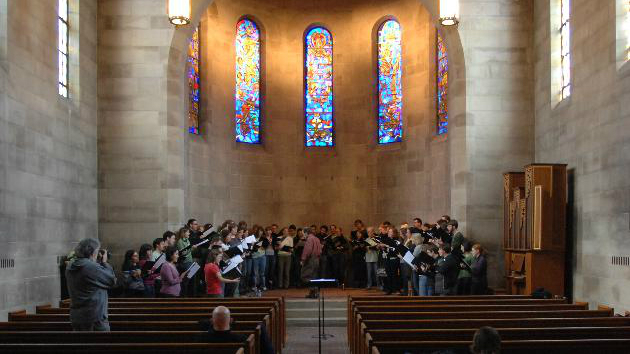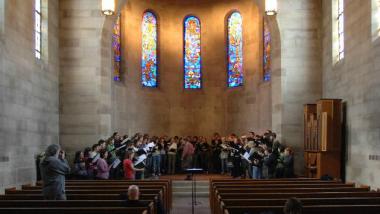
SFCV Emerging Writer Program
Unexpectedly, Collegium Musicum Oberliniense’s May 1 concert of mostly Renaissance and early Baroque music was a night of symphonies and party tricks. Or at least, that’s how the pieces performed in Oberlin Conservatory’s Fairchild Chapel were labeled by Steven Plank, the ensemble’s 25-year director and master at making early modern music accessible to audiences.
Without his dynamic direction, these beautiful songs could have blurred together in the chapel’s echoing acoustics. They are alike in style, featuring vowel-saturated melody lines that are independent yet often mimic each other’s contours, performed without instrumental accompaniment. Under Plank’s direction, the 37 student vocalists sang their way to transcendence.
The concert began with John Taverner’s Gaude plurimum — the “symphony” — so nicknamed by Plank due to its multitudinous textures and length of around 15 minutes. The piece began with just the lower voices weaving around each other, moving on a single Latin syllable per note except at the ends of phrases. After a couple of minutes, the sopranos entered and sailed through a high, five-note vocal leap with absolutely no shrillness.
The singers within each voice part achieved an impeccable blend, void of vibrato, which helped Plank emphasize the fluidity of the music. He moved his hands as through thin liquid, and the singers followed him through swells in the seamless mass of sound. Swaying and bending their knees as these surges came and went, they occasionally looked like a pop a cappella group in their half-circle arrangement. The piece finished with a triumphant “amen,” sung with palpable joy by the smiling ensemble. Swaying and bending their knees as these surges came and went, they occasionally looked like a pop a cappella group in their half-circle arrangement.
Other highlights of the program included William Byrd’s Diliges Dominum and Gustav Holst’s Ave Maria. Plank called the Byrd a “party trick” because it features four canons across eight voice parts, with four of the voices singing the original canons and four singing their inversions. Amid a concert of underemphasized consonants, the singers rendered the S’s in “Sicut te ipsum” audibly and slowly: the sibilant sounds jumped around as they took turns with the phrase, creating a silky pulse that sank into an entrancing lull.
Holst, along with William H. Harris, were the only two more modern composers on the 11-piece program. Though it featured moments of dissonance absent from the other songs, Holst’s setting of the traditional Catholic prayer Ave Maria was not out of place in a concert of devotional music. Holst composed the piece solely for female voices: The women of the ensemble stepped forward on the chapel’s platform and brought a stirring change of timbre to the concert. These singers’ technical control varied, some moving evenly through phrases and others beginning with breathiness and swelling to full power only toward the middle of those phrases. This was only a mild distraction, however, from the intertwined, breathtaking melody lines, which they rendered passionately and invariably in tune.
As the evening progressed, the light dimmed in the stained glass windows at the chapel’s pulpit. As the choir began its final piece, the chapel’s lamps shone against the windows’ gold embellishments, illuminating them in contrast with the dark blue of the night sky. It was the perfect backdrop for Harris’ Faire is the Heaven, set to an Edmund Spenser poem.
This was the most exciting piece of the night, brimful of precisely executed volume and tempo shifts. The lower voices were full and resounding, though occasionally overpowered by the sopranos, and all singers worked together to vocally illustrate a heaven that sounded “faire” indeed. Committed to the repertoire’s earnestness, Collegium created an atmosphere throughout the evening that was truly divine.

